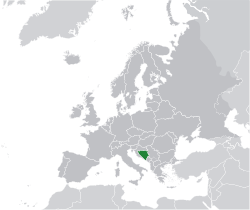Republic of Bosnia and Herzegovina
| Republic of Bosnia and Herzegovina | ||||||||||
|
Republika Bosna i Hercegovina Република Босна и Херцеговина |
||||||||||
|
||||||||||
|
||||||||||
|
Anthem Jedna si jedina Једна си једина "You are the one and only" |
||||||||||
| Capital | Sarajevo | |||||||||
| Languages | Serbo-Croatian | |||||||||
| Government | Parliamentary republic | |||||||||
| President | ||||||||||
| • | 1992–95 | Alija Izetbegović | ||||||||
| Prime Minister | ||||||||||
| • | 1992 | Jure Pelivan | ||||||||
| • | 1992–1993 | Mile Akmadžić | ||||||||
| • | 1993–1996 | Haris Silajdžić | ||||||||
| • | 1996–1997 | Hasan Muratović | ||||||||
| Legislature | National Assembly | |||||||||
| Historical era | Breakup of Yugoslavia | |||||||||
| • | Independence declared | 3 March 1992 | ||||||||
| • | Washington Agreement | 1 March 1994 | ||||||||
| • | Dayton Agreement 14 December 1995 (Implementation process until 1997.) | 1997 | ||||||||
| Currency | BH Dinar | |||||||||
| Calling code | +387 | |||||||||
|
||||||||||
The Republic of Bosnia and Herzegovina (Serbo-Croatian: Republika Bosna i Hercegovina / Република Босна и Херцеговина) was the direct legal predecessor to the modern-day state of Bosnia and Herzegovina.
The Republic of Bosnia and Herzegovina existed legally until co-signing the Annex 4 of the Dayton Agreement, containing the Constitution of Bosnia and Herzegovina on 14 December 1995, but official documents reveal that the state existed until the end of 1997 when the implementation of the Dayton Agreement was finished and only then it fully came into effect. Most of this period is taken up by the Bosnian War, in which majority of population of two of three main ethnicities of Bosnia and Herzegovina, namely (Bosnian Serbs and Bosnian Croats), established entities of Republika Srpska and Herzeg-Bosnia respectively, which were unlawful and secessionist in nature hence unrecognized by international community. Informally these events were considered by nationalists as evidence that republic was left to be representative primarily of its Bosniak population, formally presidency and government of the republic was still composed of Bosnian Serbs, Bosnian Croats along with Bosniaks. By the Washington Agreement of 1994, however, Bosniaks were joined by Bosnian Croats of Herzeg-Bosnia, which was abolished by this agreement, in support for the Republic by the formation of the Federation of Bosnia and Herzegovina, a sub-state joint entity. In 1995, the Dayton Peace Accords joined the Federation of Bosnia and Herzegovina with the Serb entity, the Republika Srpska, from that point onward recognized formally as political sub-state entity without a right on secession, into the state of Bosnia and Herzegovina.
...
Wikipedia



